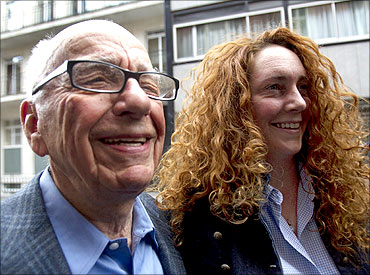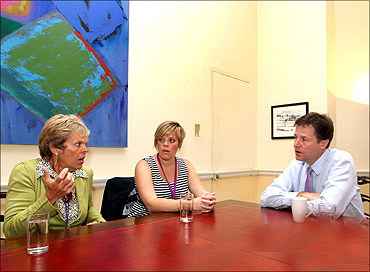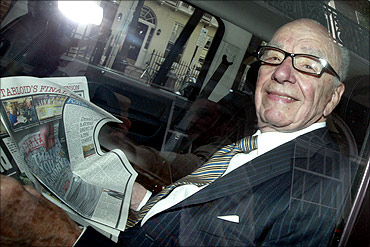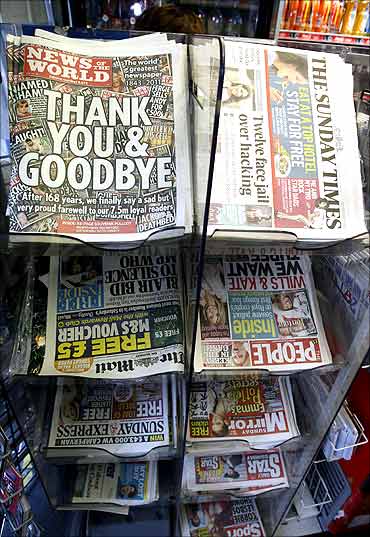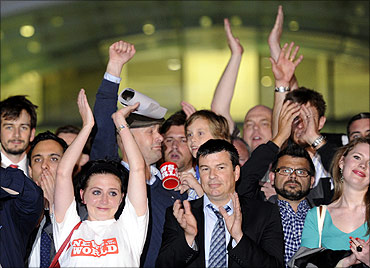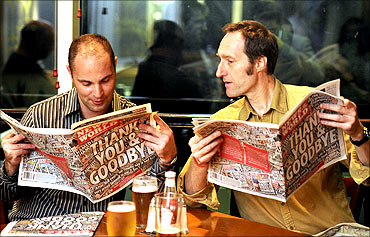 | « Back to article | Print this article |
Murdoch media empire faces its worst ever threat
He set new dubious standards or new ways of working for the newspapers he owned. They had to be profitable.
He built a huge media empire and even changed his nationality to become a naturalised US citizen so that he could expand his empire into the United States.
This is Rupert Murdoch, 80-year-old Australian.
The working practices and ways adopted by his journalists, notably those of his flagship News of the World, have led to the demise of the 168-year-old paper that once reported in its time the demise of East India Company and India becoming part of the British Empire.
Click NEXT to read on . . .
Murdoch media empire faces its worst ever threat
At the centre of this huge tornado hitting the Mudoch empire is the cosy relationships that he built with political leaders around the world, especially in the countries where his media holdings held a clout, notably Britain.
If he could not get a big foot hold in India, it was largely due to the rules left behind by the founding fathers of the nation that the media in India should be controlled by and remain in Indian hands.
Though Murdoch has landed in London to himself deal with the crisis faced by his companies, there is open talk that he may be questioned, if not arrested by the police.
Already, one of his former editors, Andy Coulson, has been arrested. He was also a friend of and became the media manager of British Prime Minister David Cameron.
Click NEXT to read on . . .
Murdoch media empire faces its worst ever threat
The relationship that Cameron had with Coulson now threatens the credibility of British Prime Minister and his government.
Newspaper headlines in Britain scream, saying the worst is yet to come. The Labour Party has seized the moment to embarrass the government and expose it where it hurts.
The simple fact, however, is that there has always been some sort of a cosy relationship between the media and the politicians; between the police and media as well.
This was held to be so true even in India in the wake of exposure of the conversations of Radia tapes. So called senior journos in India were even discussing names to be inducted into the Indian cabinet well and truly illustrated that relationship.
Click NEXT to read on . . .
Murdoch media empire faces its worst ever threat
The culture of investigative journalism or "digging the mud" that had been a special feature of the culture and journalism of the News of the World achieved huge notoriety with the availability of new technology.
This technology enables hacking of phones, computers and all that holds the privacy and secrets of individuals.
This urge to get at "breaking news" stories was taken to a shameful end when even the phones of murder victims or their families were hacked.
One police officer at the Scotland Yard has described the practice of hacking that was followed by the News of the World as being at an industrial level, meaning thereby, that it was routine practice. Is this acceptable?
Click NEXT to read on . . .
Murdoch media empire faces its worst ever threat
Tragically for the media at large, this incident has not only sullied the image of media in Britain, but also cast a huge shadow over the British police service as well.
Police officers too received cash for information they leaked to the journalists and in reverse as well.
As the scandal of this sort of investigative journalism and cosy relationships that it established between the newspaper baron Rupert Murdoch, the politicians and the police unfolds further it now not only threatens the empire that one man built, but also genuine investigative journalism so necessary in democracy.
If it is proved that the policy of making his newspapers and other media organisations commercially viable and rich by whatever means such as hacking into the private lives of individuals, corrupt relationship with police and politicians, it can be said that the man who led all this Rupert Murdoch now faces the biggest challenge in the evening of his life. His son James Murdoch too could face prosecution.
Click NEXT to read on . . .
Murdoch media empire faces its worst ever threat
The end of the News of the World may have unleashed further problems for the emperor of the media empire.
It is yet to be confirmed whether similar practices are also followed in his other media organisations the world over.
Meanwhile, leading advertisers have been pulling out their advertisements from other newspapers of the group. And the biggest takeover bid by the emperor, that for the BSkyB, is now under threat.
He is not considered as being fit by some to take over the biggest television network of Britain?
Click NEXT to read on . . .
Murdoch media empire faces its worst ever threat
British Prime Minister has announced public enquiry into the scandal as also into the working of the media in Britain.
With so much action and with so many people now trying to save themselves from the public anger at the hacking scandal, its fallout is going to hit many.
The British prime minister is making brave efforts to distance himself from the cosy relationship he had with this media empire and with Andy Coulson.
As the crisis unfolds further, will Rupert Murdoch be able to weather the storm or be swept away by it will be known in the days ahead?
